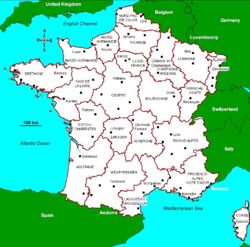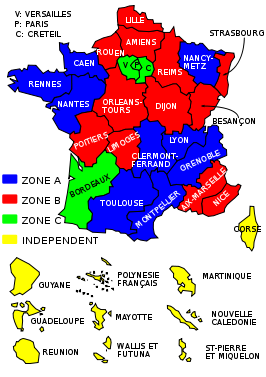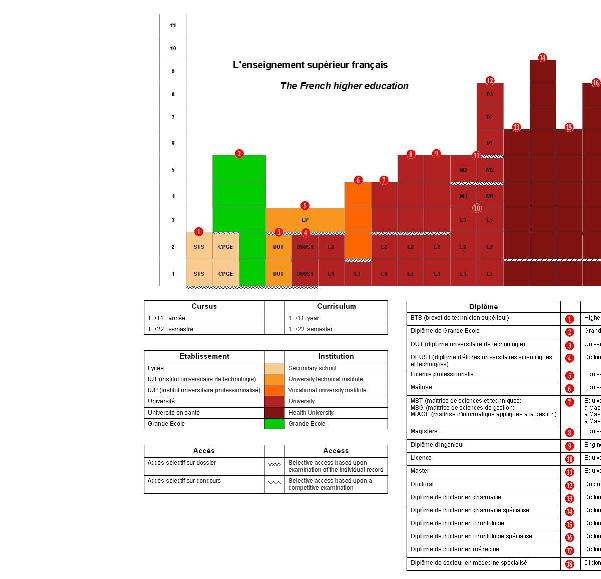Welcome to the Virtual Education Wiki ~ Open Education Wiki
France
by authorname authorsurname
Experts situated in Country
Country in a nutshell
France is a country whose metropolitan territory is located in Western Europe and that also comprises various overseas islands and territories located in other continents. After Russia, France is the largest country in Europe (643,427 km² with its overseas départements). With a population of over 63 million inhabitants, France is the second most populous country in Western Europe (after Germany). Its territory is split into (administrative) regions. 22 of them are in Metropolitan France (the part of the country that is in Europe).
French is the official language of France, but each region has its own unique accent; in addition to French, there are several other languages of France traditionally spoken, although use of these languages has greatly decreased over the past two hundred years. French is also an official language in 41 countries, most of which form what is called in French La Francophonie, the community of French speaking nations.
Education in Country
French educational system is highly centralized, organized, and ramified. It is divided into four different stages:
- Pre-primary education
- primary education (enseignement primaire);
- secondary education (enseignement secondaire);
- higher education (enseignement supérieur).
Education in France From Wikipedia, the free encyclopedia
Pre-primary education
France has a long tradition of ‘pre-elementary’ education. Despite the fact that it is not compulsory, all children attend the école maternelle (nursery school) from the age of 2 to 5, though provision to children aged 2 is based on availability. Public-sector ‘pre-elementary’ or ‘nursery’ schools are the responsibility of the education ministry and attendance at them is free of charge. In the private schools that cater for close to 2.4 % of children, parents pay a share of the tuition fees. Nursery schools are indeed schools in the full sense with programmes of teaching and learning activity. The main educational areas of activity contribute to the overall development of children and prepare them for ‘elementary’ school.
Compulsory education
Education is compulsory between the ages of 6 and 16. It is divided into three stages:
- Primary education (école primaire) Ages 6-11
- Lower secondary education (collège) Ages 11-15
- General and technological lycée (lycée général et technologique) or vocational lycée (lycée professionnel) Compulsory only between ages 15 and 16
The enrolment of pupils in state schooling is based on a ‘sectorial’ principle: pupils are normally registered in the primary school, collège or lycée of the geographical area in which their parents live. State education is free of charge. Private education is mostly Roman Catholic. Although the French constitution proclaims that the state is secular, a 1959 law allows private establishments to sign government contracts that procure financial support in exchange for some control.
The ‘elementary’ school curriculum concentrates on the basic skills of reading, writing and arithmetic, as well as on physical education (normal motor skills, etc.) and enhancing awareness and sensitivity. The lower secondary education curriculum consists of eight or nine compulsory subjects depending on the year of study, and becomes increasingly diversified with the inclusion of optional subjects. Primary school classes have a single teacher for all subjects, whereas secondary school classes have different teachers for each subject. The education ministry determines school curricula and the aims underlying the acquisition of knowledge and skills by pupils. Teachers choose their own teaching methods and school textbooks.
On completion of their collège schooling, pupils are awarded a brevet (national certificate) on the basis of their marks in the final two years and a national examination. The brevet is not a compulsory qualification and continuation of their schooling in a lycée is not dependent on their passing the examination.
Post-compulsory education/upper secondary and post-secondary level
On completion of collège, pupils are offered three educational options:
- general studies;
- technological studies;
- vocational training.
At the lycée d’enseignement général et technologique, which caters for pupils who have chosen either of the first two possibilities, provision lasts three years and leads to the general and technological baccalaureate examination that may be chosen among the three general categories (economic and social, literary, or scientific) or among the seven technological categories. The lycée professionnel prepares students in two years for the first level of vocational qualification, corresponding to the certificat d’aptitude professionnelle (CAP) or brevet d’études professionnelles (BEP). These qualifications are designed to provide direct access to employment including in-company placements or may lead to a vocational baccalaureate in one of 48 specialised fields on offer. The baccalaureate, whether general, technological or vocational, gives access to higher education.
Adapted from : National summary sheets on education systems in Europe and ongoing reforms-2007
Schools in Country
Further and Higher education
Please visit this external Wikipedia page for a full List of HEIs in France
Obtaining the baccalauréat is a pre-requisite to being admitted to an institution of higher education. The baccalauréat is a diploma that acknowledges the successful completion of secondary education and the first level of university studies. This is a very important feature of the French education system, one which has several consequences, particularly with regard to university studies and student orientation during the premier cycle (first cycle) at university.
There are four types of programmes in the French tertiary education system:
- University education,
- Preparatory classes for grandes écoles,
- Higher technical education sections,
- Specialised schools or grandes écoles.
Then, depending on the duration involved, there are two types of studies :
- Shorter technical and vocational studies undertaken in university technology establishments (Instituts Universitaires de Technologies) leading to the DUT: Diplôme Universitaire de Technologie), the universities (leading to the DEUST: Diplôme d'Etudes Universitaires Scientifiques et Techniques) or higher secondary establishments (leading to the BTS: Brevet de Technicien Supérieur). Entry into these channels is based on a selection process and account is taken of pupils' record of achievement during their secondary schooling.
- Lengthier studies undertaken at a university or one of the "Grandes Ecoles" (to which entry is after two years of preparation in the Classes Préparatoires aux Grandes Ecoles (CPGE). After admission into these schools, the studies themselves generally last three years and lead to the "diplômes d'écoles". There is no selection for entry into university. Universities issue generic qualifications and also vocational qualifications. Teacher training is also undertaken at university.
Higher education in France also has specialised schools, recruitment being based on the baccalaureate, competitions or dossiers. They concern the paramedical sector (nursing schools, physiotherapists, etc.), the social sector (schools for specialised educators, social assistants, etc.), the arts sector or architecture. Studies vary in duration and lead to state-recognised diplomas or specific school diplomas.
These categories can also be broken down further into:
- those which can be accessed directly with a baccalauréat or an equivalent diploma, involving no pre-entry selection process: university programmes, with the exception of university institutes of technology;
- those which are accessed through a pre-entry selection process: preparatory classes for grandes écoles (CPGE), higher technical education sections (STS), Instituts Universitaires de Technologie (IUT or University institutes of technology) and specialised schools. Selections are made based on an admissions application. The type of baccalauréat earned and the marks obtained by the pupil in the last two years of lycée are determining factors;
- those for which the selection process occurs after the student has obtained a licence. This is the case for IUFM (university teacher training institutes) programmes, Grandes écoles recruiting by competitive examination following two or three years of preparatory classes (CPGE mostly).
Adapted from : the Information Database on Education Systems in Europe; The Education System in France 2007/08
Teacher training is provided at Instituts universitaires de formation des maîtres (IUFM) after 3 years of post-baccalauréat studies. Access to the profession for all levels of education takes place by means of a competitive examination, followed by a practical placement which must be validated by a certificate of competency or successful performance in a professional qualification examination. Those who are successful in competitive examinations for permanent posts are offered teaching positions in an académie.
Two categories of teachers exist at the level of higher education: 1) research teachers: lecturers and university professors who have the dual task of ensuring the development of basic and applied research and of conveying the resulting knowledge to students. They are permanent state employees; 2) other higher education teaching staff: associate or guest professors; second-degree teaching staff in higher education; professors who teach classes préparatoires (CPGE); assistant teachers (which is disappearing); temporary teaching and research assistants; foreign language teachers and lecturers; part-time lecturers and part-time staff.
Adapted from : National summary sheets on education systems in Europe and ongoing reforms-2007
The amount of the enrolment fees is set each year jointly by the ministry in charge of higher education and the ministry in charge of finance. In the context of the organisation of the European higher education programme, ( LMD) tuition fees have been revised and standardised in order to facilitate student orientation. A single fee has been introduced for each course of study: 165 euros for a licenceprogramme, 215 euros for a master’s programme and 326 euros for a doctoral programme (rates valid for the 2007/2008 academic year). Engineering and paramedical programmes maintain their own registration fees. For engineering degrees, the annual tuition rate for public institutions of higher education under the authority of the Ministry of Higher Education has been set at 512 euros.
Some establishments require additional payments (special fees), which are set by its board of administration. These usually range from 10 €-30 €, but can go as high as 100 € for some services, such as unlimited computer access. Additional fees cover preventive medical costs, athletic and cultural activities, photocopies, and, in some universities, student reception services. A breakdown of fees paid is listed on the student’s university card.
The cost of certain special programmes, like the diplôme d’université(DU), is almost entirely paid for by the student, ranging from 80 € to 650 € (rounded figures valid for the 2005/2006 school year) depending on the course of study. These costs are either mandatory or optional depending on the school. Some universities do not charge them.
Universities have no legal right to increase the national registration fees through additional charges. French law gives schools the possibility of requesting additional fees, but specifies that the request must be clearly indicated as optional.
In France, students benefit from several types of financial aid: scholarships, accommodation and food aid and other financial aids. Since 2001, the proportion of scholarship students in higher education has remained stable at 30%. In 2005, 522,000 students benefited from national education grants (i.e. 1.3% more than in 2004) for a total amount of 1.3 billion Euros. Students benefiting from scholarships based on social criteria represent 95% of supported students.
In September 2007, the minister in charge of higher education presented a "new structure for the funding of student life". This new system, established as part of the "students’ living conditions" project, aims at correcting the injustices and insufficiencies of the current system and recognising students’ merit and international mobility.
Universities in Country
Polytechnics in Country
Colleges in Country
Education reform
Schools
Post-secondary
Administration and finance
Schools
School education comes under the minister responsible for education throughout the country. Free public-sector provision exists alongside education offered by private schools whose population has remained stable for several years, at 2 027 700 (primary and secondary education, 2006).
At the beginning of the 2006/07 academic year, the school population in metropolitan France and its overseas départements (DOM) for public and private sectors stood at 12.4 million students. In order for the education system to operate, the state employs more that 1.3 million people, 850 000 of whom are public sector teachers. There are almost 2.287 million students in higher education, which employs 147 000 people, 88 000 of whom are teachers in public HEIs. The language of instruction is French. The regional languages are taught as part of the modern languages branch of studies.
Notwithstanding certain decentralisation measures under which responsibility for the construction and maintenance of public-sector school buildings has been entrusted to the local area authorities, the central government has retained a decisive role in the area of educational policy. The ministry responsible for national education draws up in detail the curriculum for each subject and level of education, and provides guidelines for teaching without however obliging teachers to adopt a particular method. It administers the recruitment, training and management of teaching staff, determines the status and regulations of schools, allocating them their appropriate quota of staff. The ministry also organises examinations and awards national qualifications, in particular the baccalaureate which testifies to the satisfactory completion of secondary schooling.
In order to implement this policy and the accomplishment of its numerous management tasks, France is divided into 30 such académies each headed by a rector acting directly on behalf of the minister. An académie is the administrative level enabling the regional application of education policies as defined by the government. It allows action to be taken according to local contexts in collaboration with regional groups: communes (town) for primary education, départements (district) for collèges and régions (province) for lycées.
The system is supervised by several inspectorates. Three general inspectorates are entrusted with very broad responsibilities for evaluation at national level in addition to two regional inspectorates, one that visits primary schools and monitor the performance of teachers, and one responsible for marking and assessing school teachers at secondary level.



